Iran Adds Chinese To List Of Language Allowed To Be Taught At Schools
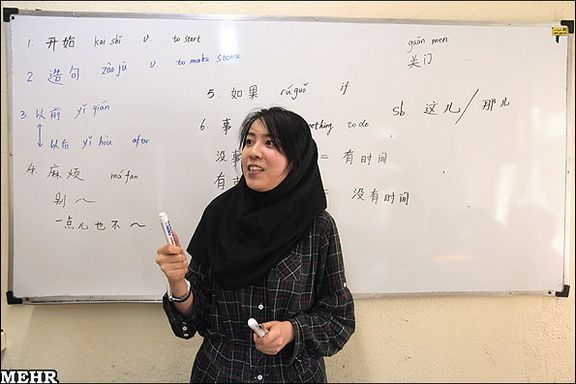
President Ebrahim Raisi has endorsed a law that adds Chinese to the list of foreign languages that can be taught in Iranian middle and high schools.

President Ebrahim Raisi has endorsed a law that adds Chinese to the list of foreign languages that can be taught in Iranian middle and high schools.
IRNA state news agency reported Saturday that this is in line with the so-called "fundamental transformation of education based on Islamic-Iranian identity".
It was three years ago and during Hassan Rouhani's administration that the issue of teaching Chinese in Iranian schools was seriously raised.
English and Arabic are two mandatory foreign languages taught in Iranian schools with French, German, Italian, Russian, Spanish and Chinese allowed as additional languages based on choices made by schools and students.
Iran’s Supreme Leader Ali Khamenei had earlier criticized teaching English in general, saying in 2016 that "now we have reached to a point that English language learning has been extended to kindergartens".
Following his comments, the ministry of education put a ban on teaching English at primary schools.
English is not included in Iran's official curriculum during the six years of primary school, but various non-governmental and a small part of public schools teach students English as an extra-curricular subject, and these classes are not mandatory.
In recent years, some government officials have also suggested that instead of English, the teaching of Russian, Chinese and German languages should be supported in Iran.
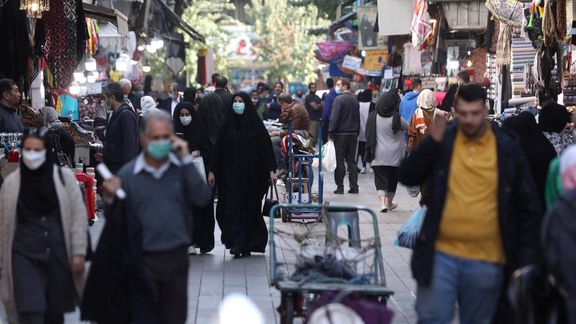
An Iranian lawmaker insisted on Saturday that the annual inflation rate in Iran is 120 percent, not 60 or 70 percent as various politicians and academics cite.
Gholamreza Nouri Ghezeljeh told Rouydad24 website in Tehran that lower inflation figures close to 40 percent presented by some officials who claim they have controlled rising prices is the product of their imagination.
The Iranian government claims to have controlled the inflation rate at about 40 percent. However, as Ghezeljeh noted "High inflation cannot be concealed from the people as they find out about it when they purchase goods in their everyday life."
"Playing with figures will not solve the problem of Iran's economy," said Ghezaljeh, adding that "downplaying economic problems will add to people's distrust of the government." Otherwise, insisting that inflation is under control, while people feel the pressure of rising prices will not solve any problem."
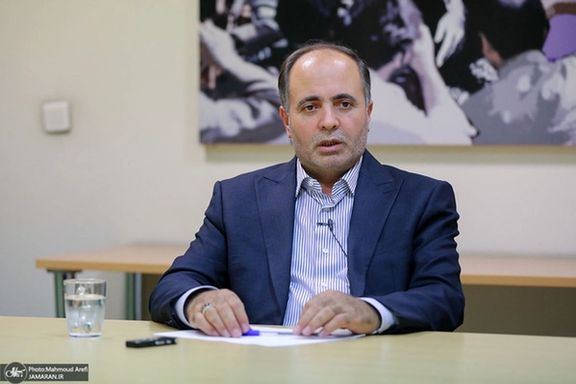
Meanwhile. Former lawmaker Gholam Ali Jafarzadeh Imanabadi blamed the Iranian President for the economic hardships and said: "Raisi is directly responsible for the people's difficult economic situation." He charged that "Raisi keeps issuing orders," but does not realize that his orders do not work.
Imanabadi claimed that Supreme Leader Ali Khamenei allowed the government to make an agreement with the West over the 2015 nuclear deal in a bid to solve the country's economic problems by lifting US sanctions. However, ultraconservative Paydari Party members in the Raisi administration obstructed such an agreement.
The former lawmaker said a nuclear agreement was within reach during the last months of Former President Hassan Rouhani's presidency as the United States was prepared to make a deal with Iran. But Raisi chanted anti-US slogans after his election in June 2021 and formed a new negotiating team that proved to be inefficient in taking the negotiations forward.
Imanabadi reiterated: "It was not US sanctions that created the current economic problem in Iran. It was Raisi's inefficiency and his grudge against the United States that led Iranians to misery although former Foreign Minister Javad Zarif had warned him that the favorable diplomatic situation was going to change in a few months."
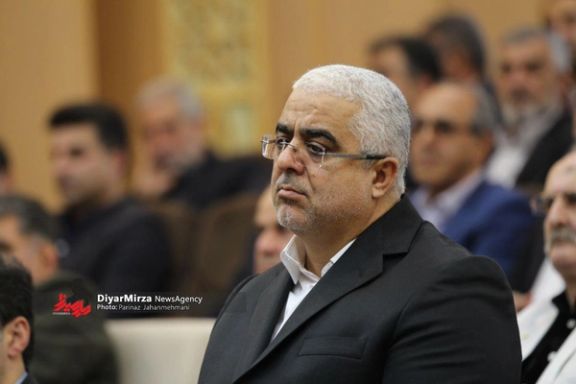
It is not clear if Imanabadi’s claim of Khamenei having given a green light to an agreement is true. Developments during negotiations in mid-2010s and in the past two years show that his office follows every detail in the talks and is the ultimate decider.
Earlier, another lawmaker, Jalal Mahmoudzadeh had said that "the government looks the people in the eye and lies to them." While the government boasts about improving economic indicators, an increasing number of Iranians are forced to live in tents erected in parks and streets as they cannot afford to rent a house particularly in the big cities.
“All the statistics and economic figures presented by Raisi, and other state officials are unreal. It is interesting that statements by the President contradict figures issued by his own government's Statistical Center of Iran."
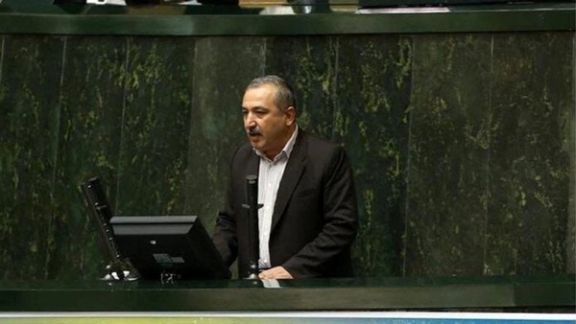
In yet another development, Iranian economist Vahid Shaghaghi Shahri told Etemad newspaper that "during the past 8 years the government has sold $531 billion of oil while there has been no job creation because employment is an outcome of productivity and investment, the two factors that have been non-existent in Iran."
Iran has sold $1.5 trillion of oil during the past 50 years, but the outcome of this has been nothing other than a non-competitive, monopolized, semi-government economy which looks like a caricature of real economy, he said.
The figure he cited mostly represents oil income during the Islamic Republic as oil prices were much lower in the 1970s.
Shahri charged that Iran's development stopped in the 2010s. Iran's economic challenges were created because of a certain school of thought [presumably religious fundamentalism and a xenophobia marked by anti-Americanism], he argued. Therefore, it is impossible to solve the economic crisis with the same approach.
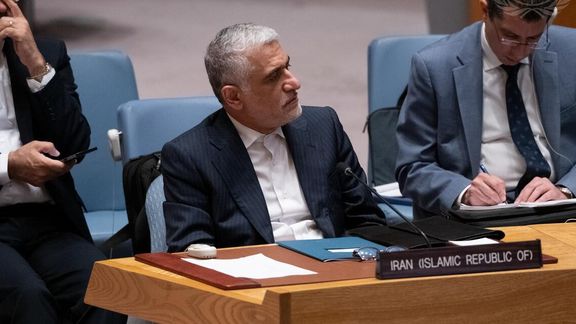
While Iran's UN envoy says Tehran is prepared to resume talks over the 2015 nuclear deal, a seasoned ex-diplomat says Tehran should accept the Western terms.
Former Iranian diplomat, Fereydoun Majlesi told Rouydad24 website in Tehran that "Iran can either accept the West's solution or follow its own path and be prepared for its consequences."
Referring to higher oil exports by Iran, he said: It is true that the restrictions imposed on Iran by the United States are getting weaker on a daily basis, but this should give no reason to Iran to continue its hostile behavior."
He explained that "In fact, Iran has restricted itself."
He also touched upon another aspect of Iran's approach to negotiations. Majlesi said: "Raisi administration's negotiators do not wish to fight the West, but at the same time, they refuse to accept the rules of negotiations. They do not know what to do and that has led to a halt."
"The three European countries in the JCPOA have declared that Iran has violated the agreement. The West believes that Iran's missile development was against the terms of the JCPOA. Some even believe that Iran is potentially very close to producing a nuclear bomb. Therefore, the minimum precondition by the West is returning to the JCPOA as it was under President Hassan Rouhani," Majlesi maintained.
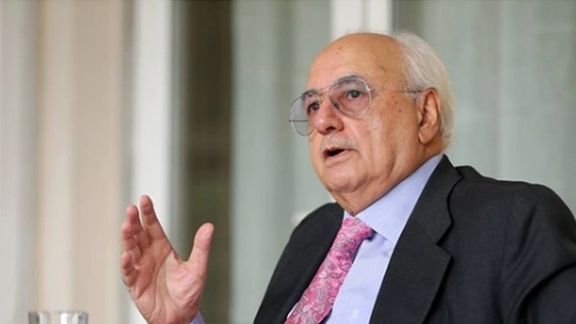
He added: "The point is that a country which is under serious pressures and its case is going to be referred to the UN Security Council can hardly set a precondition for negotiations." He added that Iranian officials should realize that the people are suffering under these pressures, so the government has only two solutions ahead: Accept the West's terms or pay for their own final solution.
Etemad Online in Tehran quoted Iran's ambassador to the United Nations, Amir Saeed Iravani as saying that Tehran's space and missile programs and regional issues do not fall within the scope of UN Resolution 2231, adding that "We are prepared to resume the negotiations to return to the JCPOA as soon as possible and to ensure its full compliance by all parties involved."
Resolution 2231 was related to the JCPOA nuclear agreement and restricted Iranian weapons capable of carrying nuclear weapons. Western powers are lately arguing that Iran is in violation of the agreement, among other things, by delivering drones to Russia.
Meanwhile, Iravani expressed strong objections to the participation of Ukraine's UN ambassador in the July 6 meeting about non-proliferation and the JCPOA. "We strongly protest to the UN Security Council Chief for inviting a country that has nothing to do directly or indirectly to the meeting's agenda. This was neither constructive nor indicative of goodwill," he said.
He described inviting Ukraine's representative to the meeting, "an attempt to divert attentions from the agenda which was discussing implementing the JCPOA and Western side's non-compliance to the agreement particularly the United States' withdrawal from the deal."
He further insisted that Washington should be recognized as the party responsible for the current situation as it has withdrawn from the 2015 deal. Iravani added that the three European partners of the JCPOA have neglected their commitments under the deal and Resolution 2231. He said the United States has arrogantly forced other UN members to violate Resolution 2231. "this is unprecedented," Iravani said.
Under the circumstances, Iravani said, Iran has no choice other than adopting countermeasures to restore its rights under paragraphs 26 and 36 of the JCPOA. "It was the United States and not Iran that left the agreement," he said, adding that whatever Iran has done as her reaction is revocable once the agreement is restored.
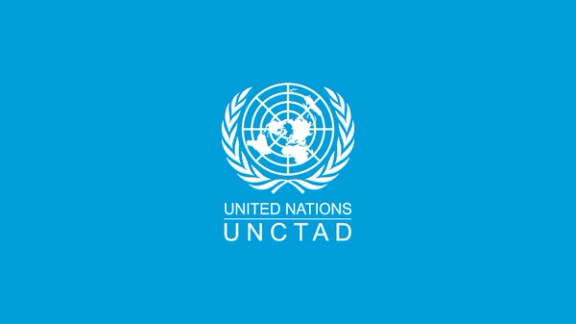
The United Nations Conference on Trade and Development says Iran's share of attracting foreign investment last year was only one tenth of a percent (one thousandth) of the world total.
According to this report, published June 5, Iran has managed to attract only 1.5 billion dollars of foreign direct investment in 2022.
In 2017, and after the lifting of international sanctions, Iran attracted more than five billion dollars in foreign direct investments, but in 2018, this was halved, and after that, the annual amount fluctuated around 1.5 billion dollars.
The United States imposed oil export and banking sanction on Iran in 2018, making a series of demands including a stronger agreement to restrict Tehran's nuclear and missile programs. Thes sanctions have triggered an economic crisis, driving annual inflation to 70 percent and reducing the value of Iran's currency 12-fold.
Among Iran's neighboring countries, the UAE has attracted the most foreign investment.
In total, the Arab countries of the Persian Gulf region have attracted about 37 billion dollars in foreign direct investment in 2022, of which the UAE's share is 60%. Last year, Turkey attracted $13 billion.
The United States attracted the highest amount of foreign direct investment in the world with $285 billion, followed by China, Singapore and Hong Kong.
The US is also at the top in terms of investment in foreign countries with 269 billion dollars.
Figures by the UNCTAD show that a total of 1.3 trillion dollars of direct investment was made last year, which is 12% less than in 2021. The reason for the drop was the decrease in investments by advanced countries abroad.

The involvement of the FBI in looking into the conduct of US envoy for Iran Rob Malley could indicate a suspicion of criminal wrongdoing, Semafor has reported.
Iran International first reported June 29 that Malley has been absent for a considerable time, his security clearance has been suspended and he is under investigation related to his handling of classified documents. The Involvement of the Federal Bureau of Investigation was also reported, although until now no official details have been announced, except that Malley is on “unpaid leave.”
Semafor, however, confirmed Friday that the FBI is investigating Malley, according to a source briefed on the matter within the State Department.
The State Department has only confirmed that Malley is on leave and his deputy Abrams Paley is serving as acting special envoy for Iran. The department did not offer any more information to Semafor either.
Congressional leaders and lawmakers however have been demanding explanations from the Biden administration, since they were never informed about Malley’s long absence.
Soon after the news broke about Malley’s status, the chairman of the House Foreign Affairs Committee Rep. Michael McCaul demanded answers referring to reports that Malley was placed on unpaid leave the same day that Iran International reported about the investigation.
“These reports raise serious concerns both regarding Malley’s conduct and whether the State Department misled Congress and the American public,” McCaul wrote to Secretary of State Antony Blinken.
Semafor quoted a senior US official as saying that “government agencies would not suspend a clearance independently unless a law enforcement agency has an open investigation.” It also said that although details still remain unclear, “But the involvement of the FBI is significant in that it indicates there could be suspicion of criminal wrongdoing.”
Senator Bill Hagerty (R-TN) also tweeted on the matter June 30, raising a series of questions. “When did the investigation that led to the suspension of Malley’s clearance begin?”, asked Sen Hagerty, and added, “When were Secretary of State Antony Blinken and President Joe Biden informed of it?”
The senator further asked, “Why did they allow Malley to continue in his diplomatic role while under investigation?” He went further questioning Malley’s appointment in the first place, mentioning that his “contacts with Hamas and other extremist groups raised concern in the past.”
After Fox News also reported on Malley’s situation, Sen. Hagerty tweeted June 6, “This scrutiny of the Biden Admin is warranted given Iran's history of supporting terrorism & pursuing nuclear ambitions. The Admin must take a firm stance in dealing with this regime, & anyone mishandling classified information must be held accountable.”
Many Iranian American activists, who always saw Malley as biased in favor of the Iranian regime, are also asking questions.
Reza Behrouz, a neurologist and professor in Texas tweeted, “We as members of the Iranian American community who initially cautioned about his [Malley’s] appointment…deserve to know what is at stake here. To what extent his egregious conduct adversely affected the national uprising in Iran?”
Meanwhile, other officials are continuing talks with Iran as the administration
Academic and former hostage in Iran Xiyue Wang also tweeted, “In light of Rob Malley’s mishandling of classified information, Biden should suspend all negotiations with Iran at least until the investigation is concluded.”

Nazila Maaroufian, a journalist and student at Allameh Tabatabai University in Tehran, was arrested on Saturday following a summons to the Prosecutor's Office at Evin prison.
Her arrest occurred after security agents from the intelligence ministry raided her home last week and ordered her to appear at the prosecutor's office.
In a tweet, she shared the details of the government agents' invasion of her home to conduct a search and confiscate her personal belongings. She emphasized that despite Iranian citizens being deprived of safety even within their own homes, they should persevere and not surrender.
Maaroufian was previously employed by the moderate Iranian news website Rouydad 24, which had been a reliable source of news about developments in Iran.
However, in March, the Iranian regime blocked access to the website after it published an interview with Amjad Amini, the father of Mahsa (Zina) Amini.
Mahsa Amini, a Kurdish Iranian woman, died in the custody of the "hijab police," sparking the current wave of anti-regime protests, which are the largest the Islamic Republic has faced since its establishment in 1979.
Nazila Maroufian and Marzieh Amiri, journalists from the outlet, were imprisoned due to the interview and their reports on the protests.
After 72 days of detention, Maroufian was temporarily released from Gharchak Varamin prison on a bail of six billion rials. However, she was later sentenced to two years in prison on charges of "propaganda and publication of lies."